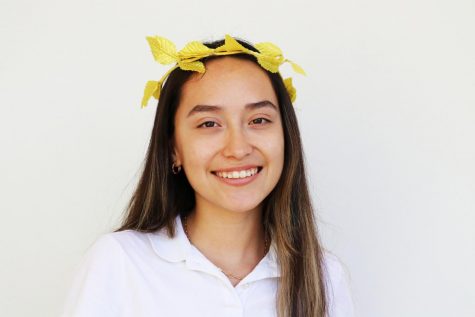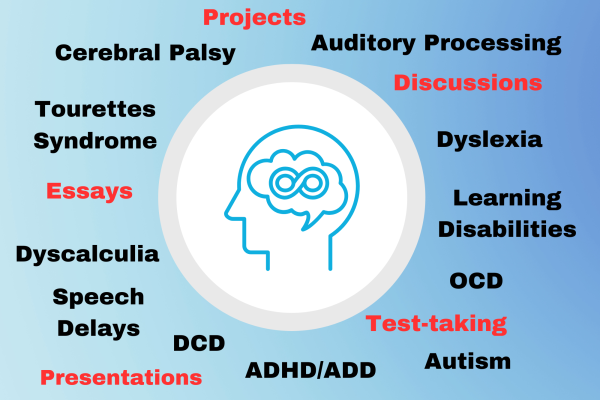Column: What it’s actually like being Latina in the classroom
Photo credit: Leslie Castaneda
An artistic illustration by junior student-artist, Leslie Castaneda, of myself. This piece is a reflection of my specific experience as a student of color in the classroom.
“Are Latinas responsible for teaching their peers about their race?” This is a question that has popped up in my life multiple times recently. Whether it comes up at an Hermanas Unidas affinity meeting, at a debrief of “The Hate U Give” at Archer’s Diversity Conference or when setting classroom norms for our race unit in history class, it is a question I have honestly been scared to answer.
Being Latina has become a huge part of my identity. Over the course of my three years in high school, I’ve fully embraced my latinidad and have been outspoken about my point of view on racial issues. I write this column specifically about my experience as a Latina and I’m a leader of the Hermanas Unidas club, in which we dedicate our time into teaching our community about our culture. I’ve written what feels like countless essays on race and if you have ever been in a history or English class with me, you know that I always bring it up.
But is being Latina all that I am? Should it define me as much as it does right now?
It’s an answer I have been looking for and going back and forth with for a while. When I wrote my first-ever column for the Oracle, I concluded the piece by saying how I was ready to “take on” uncomfortable conversations and how I wanted to be “outspoken” and “have pride” in my culture. The whole piece was about me finding my ethnic identity and the culture shock I experienced when I first came to Archer. I wrote about the process of taking on the role of a Latina student at Archer almost as if I was coming to terms with something.
As a junior now, I want to challenge the narrative I immersed myself in. I think it is a lot more complex than my sophomore self thought it was. Reading that column again, there is still a lot I profoundly agree with, but I feel that it was what I thought I “should” do or what I was “supposed” to do. I’ve built a lot of the person I am today on this singular social identifier, so I started to feel like as a student of color, this is what I should be doing or what I am “good” at doing.
There must be a balance between pressure to represent your culture and being passionate about it. It’s a gray area I have been constantly thinking about.
At the end of the day, Latina is not absolutely everything I am. Our classrooms should not depend on students of color to provide the Person of Color [POC] perspective. When a student’s racial group is brought up in class, the whole class shouldn’t turn to that student to speak. How do we expect one person to speak for a whole group of people, a group that is sometimes made up of millions? “I can only speak from the ‘I’ perspective,” I heard a Latina friend say at the lunch table once. We don’t go to school to do the teaching or correcting.
But I’ve always felt like if I don’t do it, who will? I don’t want the POC perspective to be lost. I want people to know about it, and I want to spread it, but I also don’t want to feel obligated to do a job I can’t do by myself.
But do we rely on white teachers to teach about race and privilege? In my experience, there are white teachers who are trained and qualified to teach these lessons, but some still look to students of color in the room to answer the “awkward” race questions.
I know fellow students of color who express frustration about being taught by white teachers, but if recruiting teachers of color is so difficult, do we want students of color to have to fill in these gaps?
I still don’t know where I stand because it is such a complicated issue, but I think it is important to see that both sides are valid. There will always be tension when talking about race in the classroom, but it’s important for white teachers to be mindful of their students of color, and it’s also important for students of color to feel whatever it is they feel.
I personally think I do take it upon myself to be very vocal about my point of view as a POC, but I acknowledge not everyone feels the same way, and that is fine. All students of color have different comfort levels, different experiences and different upbringings that contribute to this decision. We are not all the same; therefore, we should not all be held to a specific standard or expectation.
I want to take on the role of a student in the classroom and be allowed to define that as I choose, rather than being expected to be the teacher.
Correction statement: This column was updated on Feb. 15 at 12:15 p.m. in order to clarify the author’s meaning in the final paragraphs.

Celeste Ramirez joined the Oracle as a columnist in 2017 and is now the Multimedia Editor. Her column focuses on diversity at Archer, highlighting the...














Glory • Feb 21, 2019 at 12:52 am
This is so, so, so important! Thank you for bringing this to attention. I see so many of your articles and it really helps me feel represented, and feel like these concerns that some of us are a bit too frightened to bring to the attention of the community are being voiced. You are very brave and intelligent and I love reading your articles!
Jennifer Dohr • Feb 15, 2019 at 2:49 pm
Wow. Celeste, thank you. Your piece is a gift to the community. You’ve given me much to think about as a teacher and as a person, and I’m grateful to you. So proud of your courage and your eagerness to grapple with the complexities of your ever-shifting identity.
Destiny Morado • Feb 15, 2019 at 1:28 pm
Wow! You’re amazing, thank you for being one of the people who can truly articulate how some of us feel but don’t know how to say it or who to say it to.
Charley • Feb 14, 2019 at 11:35 pm
Wow Celeste, really good article and important insights to share with the community! Great job!
Kelly Tuxpan • Feb 14, 2019 at 11:33 pm
Celeste, I like that you bring these difficult questions, that I have struggled with myself, outside of the Hermanas and classroom setting. I think being Latina doesn’t have to be the only thing you are and I don’t think it ever is. There are so many aspects that contribute to your idenitity and I see ethnicity as an addition to the journalist you are, or the researcher I hope to be. Things like professions and aspirations aren’t usually things that can put us in a disadvantage due to societal values, the way race and ethnicity do, which is probably why our latinidad and the education of the community feels so much bigger to us. I don’t have answers to most your questions but I guess that just means we have to figure it out, and our answers may not even be the same because I think it depends on the person whether or not they use their experience as a part of a certain ethnic group to add to their experience as a lawyer, teacher, or whatever they become. I love you!